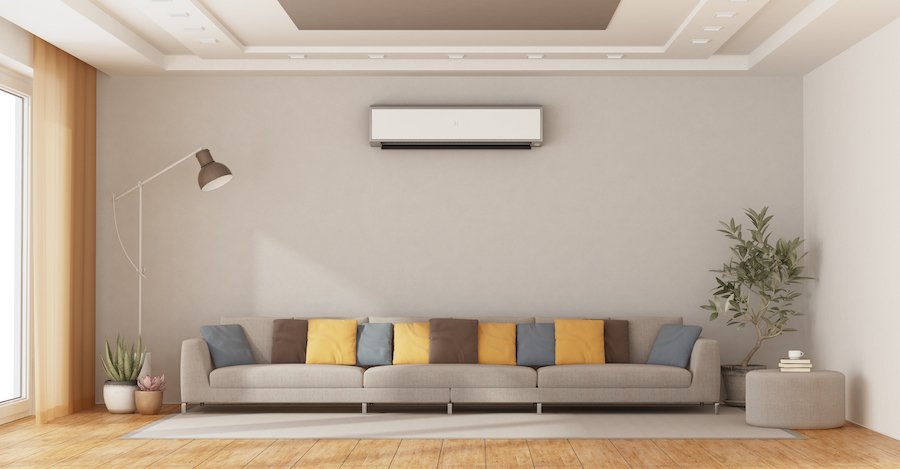
With the hot summer days, air conditioning units are essential for maintaining comfort within our homes. But have you ever wondered how these units work? The key components of an air conditioner are the compressor, condenser, evaporator, expansion valve, refrigerant, air filter, and thermostat. This article will look at the elements that contribute to the system, understanding their functions and roles in keeping your home cool and comfortable during the summer months.
Compressor
The compressor in an air conditioner is an essential component that plays a key role in the cooling process. It compresses the refrigerant into a high-pressure gas, which then circulates through the air conditioning system to absorb heat from the indoor air. The compressed refrigerant is then sent to the condenser, where heat is released, and the refrigerant returns to its liquid state, and the process continues. The compressor is crucial to the AC’s performance and efficiency. Without a properly functioning compressor, the air conditioner will be unable to effectively cool the indoor air, resulting in poor performance, increased energy consumption, and potentially costly ac repairs or replacement. Keeping the compressor in good working order is crucial for optimal air conditioning performance and minimizing the need for ac repair.
Condenser
The condenser releases the heat the refrigerant absorbs from the indoor air to the outside environment. It happens because the refrigerant transitions from a high-pressure gas to a high-pressure liquid as it flows through the condenser coils. As a result, the heat is transferred to the air surrounding the coils, and the cooled refrigerant can then flow back into the evaporator coil to absorb more heat. Without a properly functioning condenser, your air conditioner could not cool your home effectively. Therefore, it is important to keep your condenser well-maintained, clean, and free from any obstructions that could hinder its performance.
Evaporator
The evaporator is responsible for cooling the air distributed throughout your room. The evaporator coil absorbs heat from the warm air that enters the air conditioner. Then, it transfers the heat to the refrigerant fluid, which is eventually pumped out of the air conditioner. This process is crucial because it ensures that the air you breathe is cool and free of excess moisture. Without the evaporator, air conditioners would be ineffective and unreliable. So, the next time you switch on your AC, take a moment to appreciate the ingenious design behind its cooling mechanism.

Expansion Valve
The expansion valve controls the flow of refrigerant, which plays a critical role in maintaining proper temperature and humidity levels. Essentially, the expansion valve is a small device between the evaporator and condenser coils in the air conditioner. It helps to regulate the pressure of the refrigerant as it moves through the system, allowing it to expand and contract appropriately. Without the expansion valve, the air conditioner would be unable to maintain a consistent temperature, and cooling would be inefficient.
Refrigerant
Refrigerant is a substance responsible for cooling the air circulating throughout the space. Without refrigerant, your air conditioner would blow around the same hot air it had sucked in. The science behind the refrigerant working in an air conditioner is simple yet complex. Essentially, the refrigerant absorbs heat from the air inside the unit and then releases that heat outside, creating a cycle that keeps the air in the room cool. Ensuring your air conditioning unit is filled with the right amount of refrigerant and functioning optimally is important. It keeps you comfortable and can save you money on your energy bills in the long run.
Air Filter
The air filter in an air conditioner is a crucial component that keeps your indoor air clean and fresh. Essentially, the filter traps dust, pollen, and other particles as air flows through the system, preventing them from circulating throughout your home. It means that your air conditioner not only cools your space but also helps to improve your overall air quality. In addition, a clean filter contributes to a more efficient AC unit by allowing air to flow freely. Neglecting to replace your filter regularly can lead to decreased performance, higher energy bills, and even damage to your system. Therefore, checking your air filter every month and changing it as needed is important to ensure your air conditioner runs as effectively as possible.

Thermostat
The thermostat in an air conditioner is a crucial component that plays a major role in regulating the temperature of a room. It works by constantly monitoring the temperature in a room and then adjusting the air conditioner’s cooling cycle accordingly. When the room reaches the desired temperature, the thermostat signals the air conditioner to switch off and resumes operation only when the temperature rises above the preset level. It ensures that the room is always at the optimal temperature, which is comfortable and has health benefits. By maintaining a consistent temperature, the air conditioner eliminates the risk of overheating or overcooling, which can cause respiratory problems, dehydration, and other health issues.

